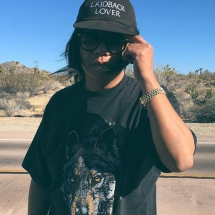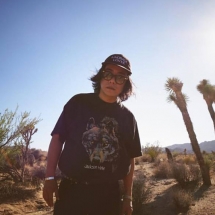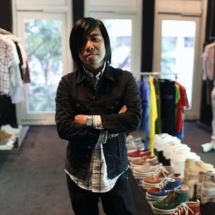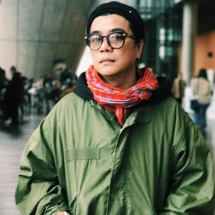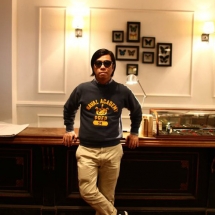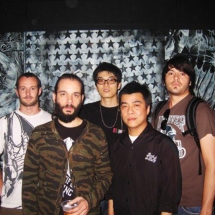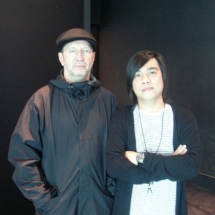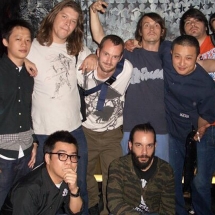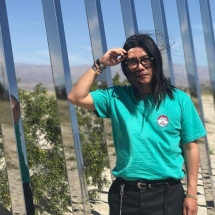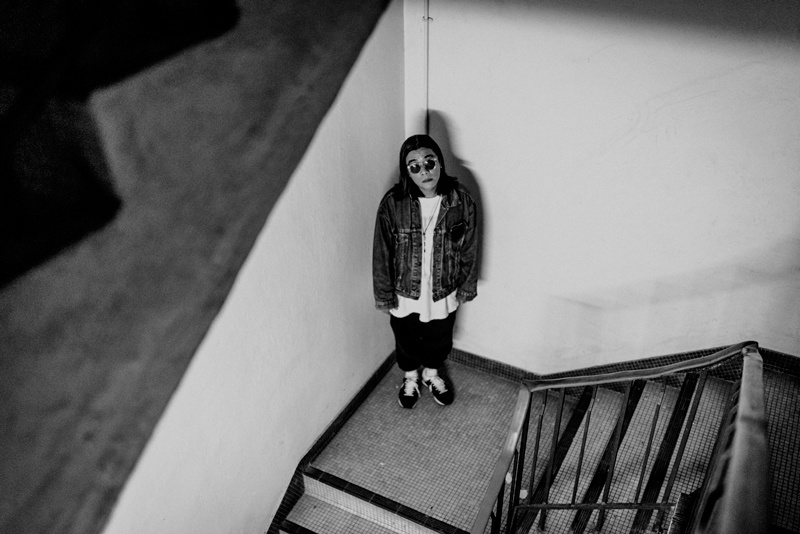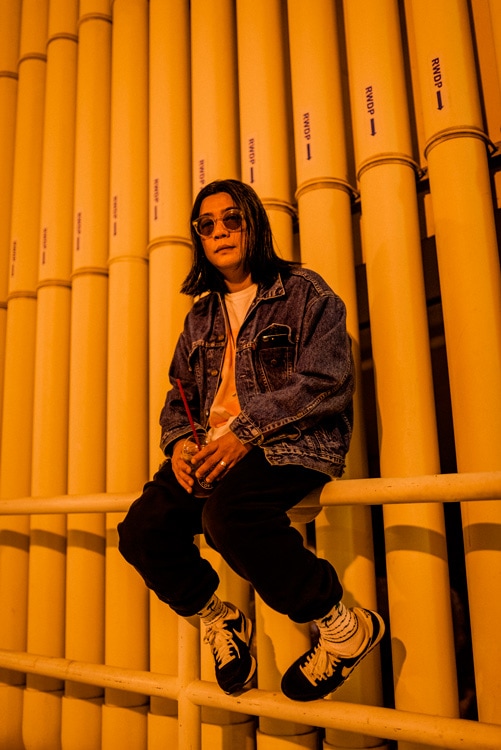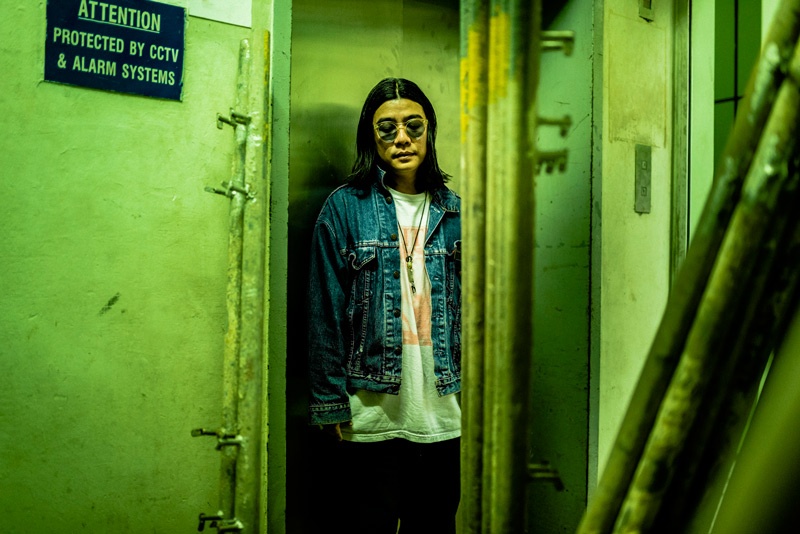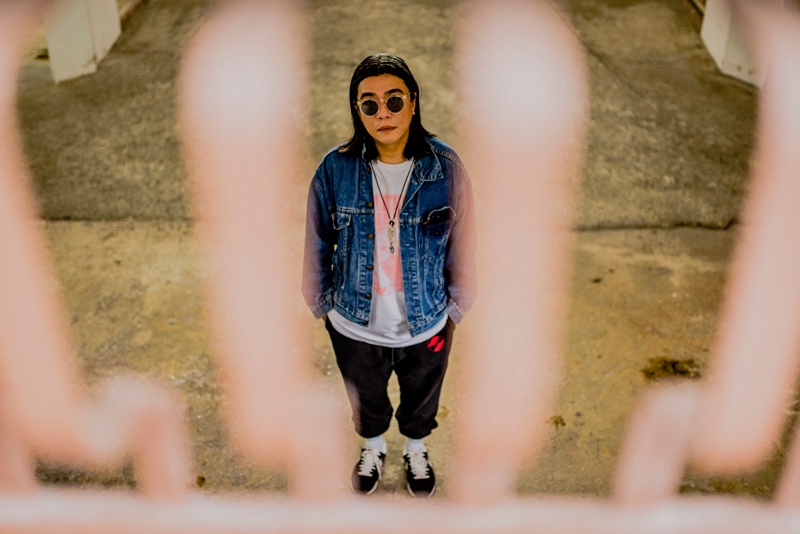Earn Chen tells me that everything he’s ever done, has been a failure. Everything? I ask, slightly incredulous. “Pretty much.” Earn is the current global creative director for HYPEBEAST. It’s a site hailed internationally as the leading authority on street culture and fashion, in a time where brands like Supreme and Off-White dominate the mainstream, and casual streetwear and subculture have a direct influence on the upper echelons of the fashion world. It’s a coveted role and Earn who’s been charged with directing the rebranding of the site, is clearly well-equipped for the role—past “failures” included. An established tastemaker with a Midas touch, Earn first brought then-unknown Australian bag brand, Crumpler, into Singapore in the late nineties, which became a runaway success evident by the ubiquitous sight of Crumpler bags on the streets. He also set up multi-label streetwear stores, Ambush and Surrender, stocked with an insider’s knowledge of the latest and most desirable brands and items in street and alternative culture. These stores helped put Singapore on the map as one of the region’s go-to for special launches and exclusive product drops, with subsequent expansion into Shanghai and Jakarta. But Earn, a maverick who calls himself a “cultural entrepreneur”, grew tired of the fashion retail scene, and decided to sell his stakes to his partner. His next, unexpected leap into the F&B sector was to lend his creative vision to help set up hip Indonesian hospitality brand, Potato Head’s local outlet. This alongside founding an eighties-inspired underground dance club, Cherry Discotheque—its slight grunge and throwback music scene becoming a hotbed for the young and unaffectedly cool. In 2016, Earn gradually found his way back into fashion, by setting up what he calls a “personal, passion project”, The Salvages—an online shop selling iconic pieces from avant-garde brands like Undercover, Comme Des Garçons, Raf Simons and Vivienne Westwood—all stocked from his vast personal collection. Today, the 46-year-old is in the midst of a relocation to New York, another jump he’s making to keep himself “uncomfortable”, at an age where most of his peers and former schoolmates have long settled into a career and family life. It’s no wonder his 26-year-old niece calls him ‘Peter Pan’, as he confesses being “the stubborn one who refused to let go”. And perhaps the secret to his uncharted success might just lie in the non-conformist, rebellious “punk spirit” that he holds onto. “I'm mentoring a group of boys right now, and some of their work is not quite up to standard, but they try to pass it off as punk. I tell them that it's just bad,” he shares. “Being punk doesn't mean your work is going to be compromised. Don’t be doing shit work, and call it a punk expression. You've got to find a sweet spot where it's punk yet it’s still good craft, like Basquiat. I'm sure a lot of people can draw like him. But how many can juxtapose chaos with order? That’s when you achieve art.”
Conversations with Earn Chen
TEO REN FENG: As a cultural entrepreneur, does it mean that you create businesses out of your insight into culture? And is culture a commodity to you?
EARN CHEN: No, it’s not a commodity. I take on projects based on personal interest rather than as a business, so I tend to move on to other things after a project. There were a lot of opportunities to expand, and of course, there is the temptation, but it has never been my inspiration to do something big. For me, it is about doing what I want, and creating something that grows organically. No decision should be based on money. You need it to survive, but money should not be at the core of your business. You can't bring money to your grave.
REN FENG: So what does "culture" mean to you?
EARN: Before that it was the streets, streetwear and all that, but I think culture is something that you live—it's a way of life like how you wear a pair of sneakers or the kind of music that you listen to.
REN FENG: What motivates you when you first start a project?
EARN: I see myself as living in this small... when I create something, it's all about that world. I live and breathe it, and it’s a bit like method acting.
REN FENG: You create a little 'bubble'.
EARN: Yes. And I live in it. I've grown up that way. I was a 12, 13-year-old who is into subculture, which was quite rare. So I feel like I’ve been living in a 'bubble' of my own since young. Now, when I want to create, I create a 'bubble' of space for myself.
REN FENG: It’s not easy to maintain the idealism that you had as a child or teenager.
EARN: A lot of my friends grew out of it—and of course, one needs to face reality, start a family and get a job— all which I didn't do. I am the stubborn one who refused to let go.
I don’t like anything that’s popular.
REN FENG: Is there a secret to your persistence?
EARN: I think it’s just me being rebellious. It’s a punk spirit, not necessarily in dressing or whatever, just in the way that you think. I don’t like anything that’s popular.
REN FENG: Did you feel lonely?
EARN: Most of the time. But of late, no. I have a fiancée and a lovely dog. I can share my life with someone who understands.
REN FENG: Was being alone especially tough for you?
EARN: I always felt alone in terms of what I liked, and what I wanted to be, vision-wise. That said, you can take that loneliness and turn it into something else. Understand why you are lonely in the first place—is it because you’re different from everybody else? Perhaps being different may not be a bad thing. Right now, being weird is accepted. It is seen as a positive. But when I was growing up, it was very frowned upon if you cut your hair differently, dressed differently or listened to a different genre of music.
REN FENG: Do you think you are lucky then?
EARN: I'm definitely blessed to be living in times like these where what used to be underground has now transitioned into mainstream. I basically rode the wave right from the start, and it’s been a life lesson. I can see how fashion and cultural trends have gone in many circles.
REN FENG: Would you consider yourself an arbiter of good taste?
EARN: [pauses] No. I’m just pretty stubborn and certain of what I like.
I've never thought of myself as being cool.
REN FENG: But you're widely seen as a tastemaker and trendsetter.
EARN: I sometimes think being uncool is cool, because I was never the most popular kid in school. I was the odd one out, the uncool one, and I've never thought of myself as being cool. If I thought that way, I wouldn't be able to think the way I do today.
REN FENG: Do you still feel a little bit out of place, in general?
EARN: Yes. And the thing is, you need to be in that state. Otherwise, you lose touch with who you are.
REN FENG: An inherent discomfort?
EARN: Yes. It’s also pretty much the reason why I’m moving to New York. Initially, it was L.A., but that’s a comfortable choice. The most comfortable option is to stay in Singapore, but that’s the danger zone. I am making a sacrifice, since the standard of living in New York is higher, but I’m cool with that. Being uncomfortable is a good thing, and it’s really about taking something negative and flipping it around to make it positive. I think that’s life.
REN FENG: As someone with an eye on culture, do you feel that you are living in a time of change and revolution? A lot of people are struggling with the exponential developments in technology affecting our daily life, including an oversupply of information.
EARN: Ultimately, it is humans who are changing. Nothing else. We can talk sci-fi and about flying cars and all that... but I think the most change happens in people themselves, and we can see it.
REN FENG: How are they changing and how do you see it all settling?
EARN: I don't know, I have no answer to that. But on a physical level, it’s in the way they look and the way they dress. Fashion is an expression. I don't know what’s happening on the inside, but there’s been a clear rise of acceptance with personal statements like men keeping long hair, or people with tattoos. These little steps are very encouraging.
REN FENG: What is the reason for streetwear and subculture becoming popular with the mainstream?
EARN: The popularity of street culture did not happen overnight. It's been happening since the 1950s in London with the Mods and rockers. Subcultures are where youths hold the power. They are drawn to stuff like that, being rebellious and alternative, but you also want to belong and be part of something special when you are young. And they won't be young forever. These people are taking over and so the world changes. A lot of my friends who grew up in the late 90s, are now the heads of Nike, Adidas, and Louis Vuitton. Even Kim Jones was an intern at my friend's store in the US, and the guys from Potato Head, I knew them when they were kids who used to hang out at my store. That was 20 years ago. Right now, we’re talking about the kids who are 12 years old and wanting to buy sneakers; the ones who know streetwear brands... the youth are our future.
REN FENG: Does a streetwear brand becoming mainstream popular inherently mean losing its credibility?
EARN: Yes. It will be that way because it becomes basic. So they need to find the sweet spot between being big and being credible.
It took me a long time to realise that the hardest kind of music to make is pop music.
REN FENG: Do you think that preventing overexposure is the key to both critical and commercial success?
EARN: Maybe. But it depends on the numbers that you are looking at, if you’re comparing within Singapore or with the population of the world. Nothing is too rare or too popular, it’s just different scales I guess. And as much as I might distance myself from what is popular, I still respect it. I was just talking to a friend, who’s a music producer for the big pop stars, and we share a similar taste in music. In fact, a lot of those in the pop industry share a similar interest in culture, and it took me a long time to realise that the hardest kind of music to make is pop music.
REN FENG: Why is that?
EARN: When I was younger I used to hate pop music; we're talking about George Michael, Prince, Madonna and even Michael Jackson when he was at the top of the game. I never listened to any part of it and I hated the fact that everywhere you went, and every time you turned on the radio, you heard them. I rebelled against that. Being underground and obscure was my thing back then, and that sort of music was easy to make. But making pop music is harder. Growing older, I’ve come to the realisation that they were musical geniuses, how their music was ground-breaking for the era, and I’ve come to love these pop icons of the eighties, only after many years. When things become really unpopular or cheesy, that's when I dig it. [laughs]
Do you know Singapore has so much culture that has been forgotten? We had the period of Resistance, forgotten because nobody writes about it. That should be a part of our history, which is something I always try to bring back. [Gestures to a large white sticker plastered on the back of his phone] Do you know who drew this? It was Kurt Cobain and he always spelled his name as "Kurdt Cobain". He drew this self-portrait for my friend when he visited his music centre in Jalan Besar, which is still there. They were touring when “Smells Like Teen Spirit” was released in the US, and had no idea how big they'd become. The Singapore government didn't give them permission to play, and they were telling my friend that they could play for free in a carpark, but unfortunately that didn't happen. There was so much going on back then.
REN FENG: Why do you think that has died down?
EARN: Back then, things were done in the true spirit of punk, but right now if anything happens, it happens for commercial reasons.
REN FENG: Is that why you're moving out of the Singapore scene?
EARN: Partially. We shouldn't go for what is commercial: something for everyone and to make everyone happy. It's also a personal choice for me to dig deeper.
I don't want to read about things, I want to witness it.
REN FENG: What do you hope for the scene in Singapore?
EARN: I don't want to read about things, I want to witness it. I have a lot of friends who have been complaining that Singapore is so boring for the past 2 or 3 decades. But if you don't do anything about it, what's the point of complaining? It takes people like us, or the youth. Youth is always power. I've been mentoring a group of 17 to 20-year-old boys and I draw a lot of inspiration and energy from them. Some of them are fashion students who’ve done fashion shows on a rooftop borrowing chairs from the local coffee shop. These boys don't have the best of everything, but they make the best of everything. They are always broke, which is the right way to grow up, because it keeps them hungry and as an artist, one cannot be too comfortable.
REN FENG: What do you see in them?
EARN: Energy. They have punk energy to really push things forward, are resourceful, and have good taste. They may not be able to buy the latest sneakers or the latest t-shirt. They have never owned a name brand piece up to now. They buy the cheapest clothes, but they put it together so nicely. They turn imperfection into perfection.
****
Edited by Wy-Lene Yap
_______
Through The Decades: The Earn Chen Look Book
